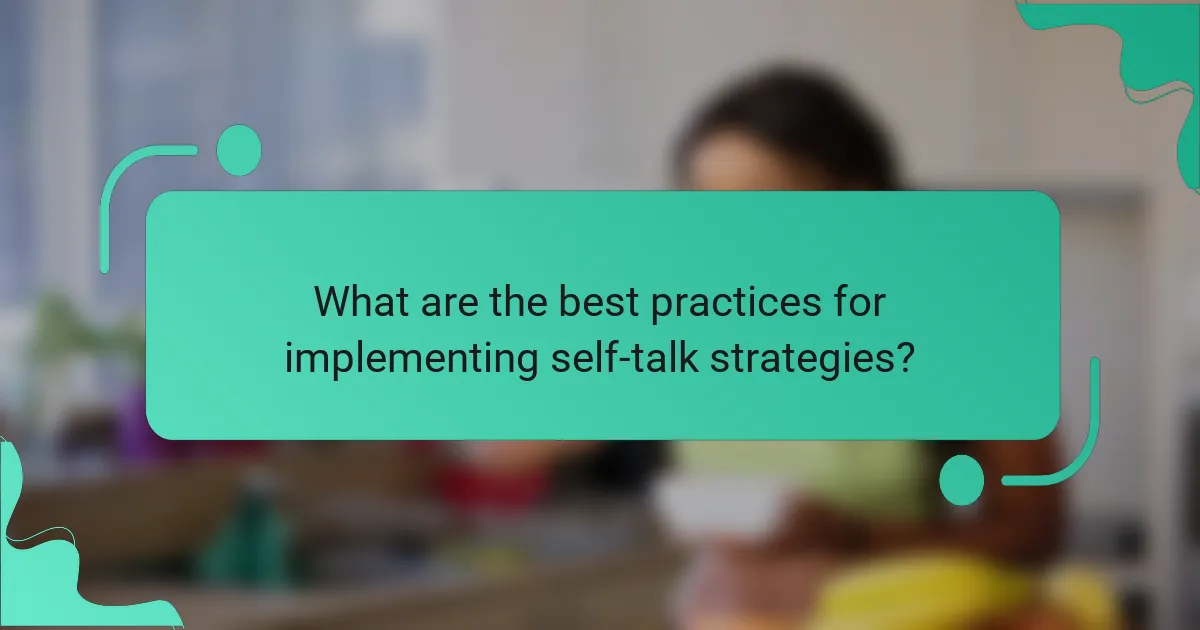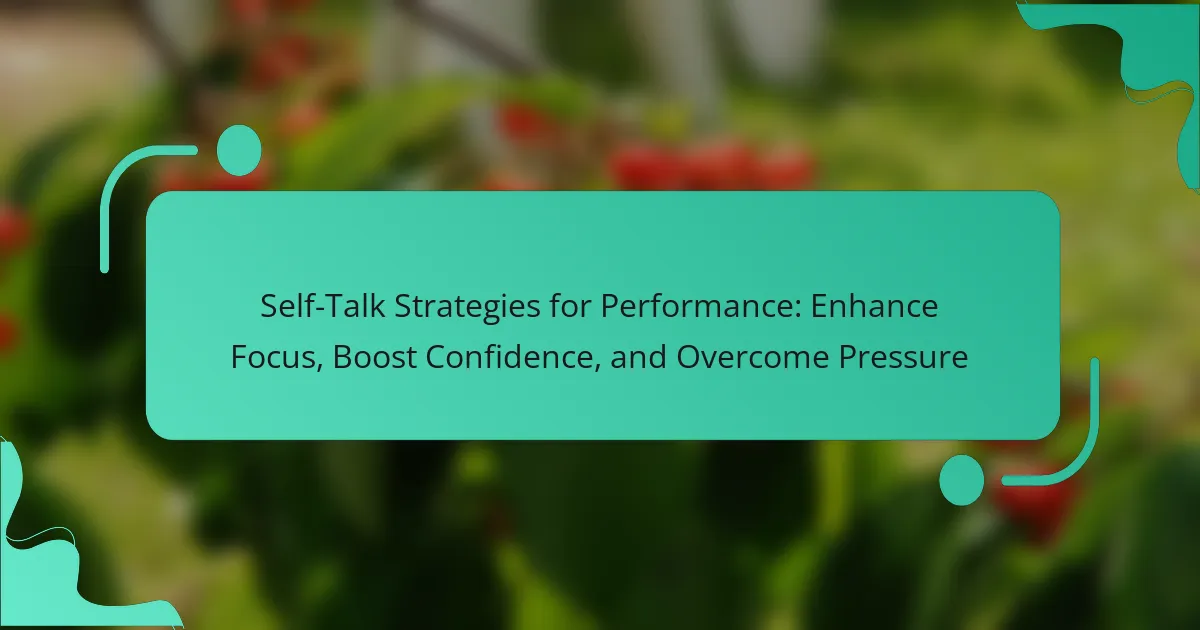Improving performance in high-pressure situations requires effective self-talk strategies. These techniques enhance focus, boost confidence, and help overcome challenges. Key methods include positive affirmations, visualization, and specific cue words. By implementing these strategies, athletes can cultivate a positive internal dialogue and improve their mental resilience.

How Does Self-Talk Influence Athletic Performance?
Self-talk significantly influences athletic performance by enhancing focus, boosting confidence, and helping athletes overcome pressure. Positive self-talk can improve mental resilience, leading to better performance under stress. For instance, athletes using affirmations report increased self-efficacy and reduced anxiety. Research indicates that structured self-talk strategies, such as cue words or phrases, can enhance concentration and execution during competitions. By cultivating a positive internal dialogue, athletes can better manage their emotions and maintain optimal performance levels.
What Are the Key Benefits of Positive Self-Talk?
Positive self-talk enhances focus, boosts confidence, and helps overcome pressure. It cultivates a positive mindset, leading to improved performance in challenging situations. Research indicates that athletes who engage in positive self-talk experience reduced anxiety and enhanced concentration. This strategy allows individuals to reframe negative thoughts, fostering resilience and motivation. Furthermore, consistent practice of positive self-talk can lead to long-term benefits in mental well-being and overall performance.
How Can Self-Talk Enhance Focus During Competition?
Self-talk can significantly enhance focus during competition by promoting positive thought patterns. By using affirmations and visualization techniques, athletes can reduce anxiety and maintain concentration. Studies show that effective self-talk strategies can lead to improved performance metrics, such as reaction time and decision-making speed. For instance, athletes who engage in constructive self-talk report higher confidence levels and a greater ability to manage pressure.
What Techniques Improve Concentration Through Self-Talk?
Self-talk techniques can significantly improve concentration by reinforcing focus, confidence, and resilience. Positive affirmations help redirect negative thoughts, while visualization enhances mental clarity. Setting specific intentions creates a clear focus, and mindfulness practices ground the mind in the present moment. Regularly practicing these strategies leads to enhanced performance under pressure.
In What Ways Does Self-Talk Boost Confidence Levels?
Self-talk significantly boosts confidence levels by reinforcing positive beliefs and reducing self-doubt. It encourages a growth mindset, enabling individuals to face challenges with resilience. For instance, using affirmations enhances self-efficacy, while reframing negative thoughts can transform anxiety into motivation. Research indicates that athletes who engage in constructive self-talk perform better under pressure, demonstrating the unique attribute of self-talk as a performance enhancer. This strategy not only elevates confidence but also improves overall focus and mental clarity during critical moments.
What Are Effective Affirmations for Athletes?
Effective affirmations for athletes focus on enhancing performance by boosting confidence and maintaining focus. Examples include “I am strong and capable,” “I thrive under pressure,” and “Every practice makes me better.” These affirmations help athletes overcome mental barriers and reinforce a winning mindset. Consistent repetition of these phrases can lead to improved self-talk and performance outcomes.
How Can Athletes Overcome Pressure with Self-Talk?
Athletes can overcome pressure with self-talk strategies that enhance focus and boost confidence. Techniques include positive affirmations, visualization, and reframing negative thoughts. For instance, using phrases like “I am prepared” reinforces belief in abilities. Visualization helps athletes mentally rehearse success, creating a sense of familiarity. Reframing negative thoughts into constructive feedback enables athletes to view challenges as opportunities for growth. These strategies collectively improve mental resilience and performance under pressure.
What Strategies Help Manage Anxiety Through Inner Dialogue?
Positive self-talk strategies effectively manage anxiety by enhancing focus and boosting confidence. Techniques include reframing negative thoughts, using affirmations, and visualizing success. Reframing involves challenging negative beliefs and replacing them with constructive alternatives. Affirmations reinforce positive self-perception and can reduce anxiety levels. Visualization helps create a mental image of success, fostering a confident mindset. These strategies create a supportive inner dialogue, helping individuals overcome performance pressure.

What Unique Self-Talk Techniques Are Used by Elite Athletes?
Elite athletes use unique self-talk techniques to enhance focus, boost confidence, and overcome pressure. These techniques include positive affirmations, visualization, and specific cues. Positive affirmations reinforce self-belief, while visualization helps athletes mentally prepare for performance. Specific cues serve as reminders to maintain focus and composure during competition. These strategies are tailored to individual needs, making them effective in high-pressure situations.
How Do Visualization and Self-Talk Work Together?
Visualization and self-talk work together to enhance performance by reinforcing positive beliefs and focus. Visualization creates mental images of success, while self-talk provides motivational dialogue. This combination boosts confidence and reduces anxiety under pressure. Studies show that athletes using both techniques report improved outcomes. Integrating these strategies can lead to a unique performance advantage.
What Steps Are Involved in Creating a Visualization Routine?
Creating a visualization routine involves several key steps. First, define your specific performance goals to focus your mental imagery. Next, select a quiet environment to minimize distractions. Then, practice deep breathing to enhance relaxation. Afterward, visualize the desired outcome in detail, incorporating sensory elements. Finally, regularly review and adjust your routine to ensure it aligns with your evolving performance objectives.
What Role Does Self-Talk Play in Recovery and Resilience?
Self-talk plays a crucial role in recovery and resilience by enhancing focus, boosting confidence, and helping individuals overcome pressure. Positive self-talk can significantly influence mental states and performance outcomes. Research shows that athletes who engage in constructive self-talk improve their focus and reduce anxiety during high-pressure situations.
In recovery, self-talk strategies foster a growth mindset, enabling individuals to reframe challenges as opportunities for learning. This approach promotes resilience, allowing people to bounce back from setbacks more effectively. Furthermore, consistent practice of positive self-talk can lead to improved emotional regulation, which is essential for maintaining motivation during recovery processes.
To optimize self-talk, individuals can employ techniques such as affirmations, visualization, and reframing negative thoughts. These strategies not only enhance performance but also contribute to long-term resilience by building a more positive self-image and reinforcing a proactive mindset.

What Are the Rare Yet Effective Self-Talk Strategies for Peak Performance?
To achieve peak performance, consider these rare yet effective self-talk strategies: visualize success, use positive affirmations, reframe challenges, and practice mindfulness. Each strategy enhances focus, boosts confidence, and helps overcome pressure. Visualization involves mentally rehearsing success scenarios, which primes the brain for real-life performance. Positive affirmations reinforce self-belief and combat negative thoughts. Reframing challenges turns perceived obstacles into opportunities for growth, fostering resilience. Mindfulness encourages present-moment awareness, reducing anxiety and enhancing concentration. Implementing these strategies can significantly elevate your performance outcomes.
How Can Athletes Utilize Self-Talk to Navigate Setbacks?
Athletes can effectively utilize self-talk to navigate setbacks by employing positive affirmations and reframing negative thoughts. These strategies enhance focus, boost confidence, and help manage pressure during challenging moments. Positive self-talk reinforces an athlete’s belief in their abilities, while reframing allows them to view setbacks as opportunities for growth. Research shows that athletes who practice constructive self-talk experience improved performance and resilience.
What Uncommon Affirmations Can Lead to Breakthroughs?
Uncommon affirmations can significantly enhance self-talk strategies, leading to breakthroughs in performance. These affirmations, such as “I thrive under pressure,” shift mindset and build resilience. They reinforce focus and boost confidence, enabling individuals to overcome challenges effectively. By integrating unique affirmations into daily routines, one can transform self-perception and achieve peak performance.

What Are the Best Practices for Implementing Self-Talk Strategies?
To effectively implement self-talk strategies, focus on positive affirmations, set specific goals, and practice regularly. These practices enhance focus, boost confidence, and help overcome pressure. Start by identifying negative self-talk patterns and replace them with constructive phrases. Utilize visualization techniques to reinforce positive outcomes. Regular reflection on progress can further solidify these strategies.
How Can Athletes Create a Personalized Self-Talk Plan?
Athletes can create a personalized self-talk plan by identifying their specific performance goals and challenges. First, define key phrases that resonate with personal values and desired outcomes. Next, incorporate these phrases into daily routines, especially before competitions. Regularly evaluate and adjust the plan based on experiences and outcomes. This tailored approach enhances focus, boosts confidence, and effectively manages pressure.
What Common Mistakes Should Be Avoided in Self-Talk?
To enhance performance through self-talk, avoid these common mistakes: using negative language, lacking specificity, failing to practice regularly, and ignoring emotions. Negative language can diminish confidence. Specificity in affirmations boosts focus and effectiveness. Regular practice reinforces positive habits. Acknowledging emotions helps tailor self-talk to current situations.
What Expert Insights Can Enhance Self-Talk Techniques?
Expert insights can significantly enhance self-talk techniques by providing actionable strategies. Focus on positive affirmations, visualize success, and practice mindfulness to improve performance. Research indicates that athletes using structured self-talk experience a 20% increase in focus and confidence. Incorporating specific phrases tailored to individual challenges can create unique motivational triggers. Regular practice of these techniques leads to better stress management and resilience under pressure.
